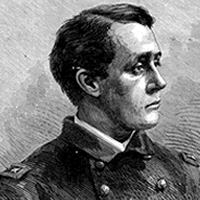
|
|
VITAL STATISTICS
|
BORN: 1834 in Brooklyn, NY.
DIED: 1896 in New York City, NY.
CAMPAIGNS: Peninsula, Antietam, Chancellorsville, Gettysburg,
Spotsylvania, Bloody Angle and Sayler's Creek.
HIGHEST RANK ACHIEVED: Major General.
|
|
BIOGRAPHY
|
| Francis Channing Barlow was born in Brooklyn, New York on October 19, 1834. After graduating from Harvard in 1855, he practiced law in New York City until the Civil War began. He enlisted as a private in the 12th New York, a commitment of three months, then reenlisted. Barlow was a colonel of the 61st New York in the Peninsula Campaign, and was seriously wounded at Antietam. On September 19, 1862, Barlow became a brigadier general. He commanded a brigade in the XI Corps, which was routed by Lt. Gen. Thomas J. "Stonewall" Jackson at Chancellorsville. At Gettysburg, Barlow was temporarily paralyzed by a bullet, and left for dead. Confederate Brig. Gen. John B. Gordon took care of Barlow until he recovered, at which point Barlow returned to service in the Union Army. Barlow was able to command a division in the II Corps while Gen. Ulysses S. Grant was beginning his operations against Richmond in 1864. One of Barlow's major accomplishments was to lead his troops, joining Maj. Gen. David B. Birney's divisions, in a charge of the "Mule Shoe" at Spotsylvania. They succeeded in capturing 3,000 Confederates, 2 generals (George H. "Maryland" Steuart and Edward "Old Allegheny" Johnson), 20 guns and 30 regimental colors. Barlow was called one of the "boy generals" because he kept himself clean-shaven, unlike the predominant practice of sporting a beard or mustache. Although he was frail-looking and pale, he was an intense fighter and strict disciplinarian. Theodore Lyman, a zoologist of the period, wrote of Barlow that he carried "a huge saber, which he says he likes, because when he hits a straggler he wants to hurt him." After the siege of Petersburg, Barlow's heath failed, although he returned to the army to lead a division at Sayler's Creek and Farmville. He was commissioned a major general on May 25, 1865. After the war, Barlow returned to his law practice, and was one of the founders of the American Bar Association. Serving as New York State attorney general, he began the proceedings to prosecute the Tweed ring, a corrupt group of Tammany Hall politicians. Barlow died in New York City on January 11, 1896. |
|

